- Overview: RingGo Parking App
- How Does the RingGo App Work?
- Why Is RingGo Popular Across the UK?
- Cost to Develop an App Like RingGo in the UK
- RingGo App Cost Breakdown by Complexity Levels
- Cost Breakdown by Development Stages
- Factors Affecting the Cost to Build a Parking App Like RingGo
- 1. UI/UX Design
- 2. Backend Development
- 3. Third-Party Integration
- 4. Security Measures
- 5. Compliance Requirements
- 6. Platform Selection
- 7. Technology Stack
- 8. Complexity of Features
- 9. Development Team
- 10. Hiring Model
- Hidden App Development Cost
- App Maintenance
- App Hosting
- App Promotion & Marketing
- Legal & Licensing Fees
- Tips to Optimize Costs to Build Apps Like RingGo
- 1. Outsourcing Development
- 2. Choosing the Right Technology
- 3. Minimizing Feature Set
- 4. Efficient Project Management
- 5. Automated Testing
- 6. Regular Maintenance Checks
- App Monetization Strategies for a Parking App Like RingGo
- 1. Transaction Fees and Commissions
- 2. Account Management Fees
- 3. Subscription and Premium Models
- 4. In-app Purchases
- 5. Advertising and Sponsored Content
- 6. Affiliate Marketing
- 7. Technology Services
- Features to Build a Robust Parking App That Outperforms RingGo
- 1. User-Friendly Registration and Profile Management
- 2. Real-Time Parking Availability and Smart Search
- 3. Advanced Booking and Reservation System
- 4. Secure and Multiple Payment Options
- 5. GPS Navigation and Route Optimization
- 6. License Plate Recognition (LPR) and Contactless Entry/Exit
- 7. Parking Time Alerts and Auto-Extension
- 8. Dynamic Pricing and Demand-Based Charges
- 9. Digital Parking Permits and Memberships
- 10. Parking History and Expense Tracking
- 11. Customer Support and Emergency Assistance
- 12. Gamification and Loyalty Rewards
- 13. Multi-Platform Accessibility and Cross-Device Syncing
- Reimagine the Car Parking Experience with Appinventiv
- Frequently Asked Questions (FAQs)
European cities like Rome, Italy (66%) and Manchester, England (71%) rely heavily on cars while commuting. Thus, finding parking is becoming a big hassle for both drivers.
The old-school parking using cash or meter systems ends up with never-ending queues, frustration, and inefficiencies. However, these drawbacks have paved the way for cashless parking solutions, making the process faster and more convenient.
The icing on the cake? Leading parking apps like RingGo are transforming the experience, ensuring a seamless and hassle-free approach to parking. With just a few taps on a phone, drivers can quickly find and pay for parking. These apps make parking easier, help cities manage space better, and reduce traffic congestion.
The unavailability of proper parking or inadequate parking spaces is also one of the major drivers of parking app market growth. The demand for custom parking booking app development is a massive opportunity for businesses looking to invest.
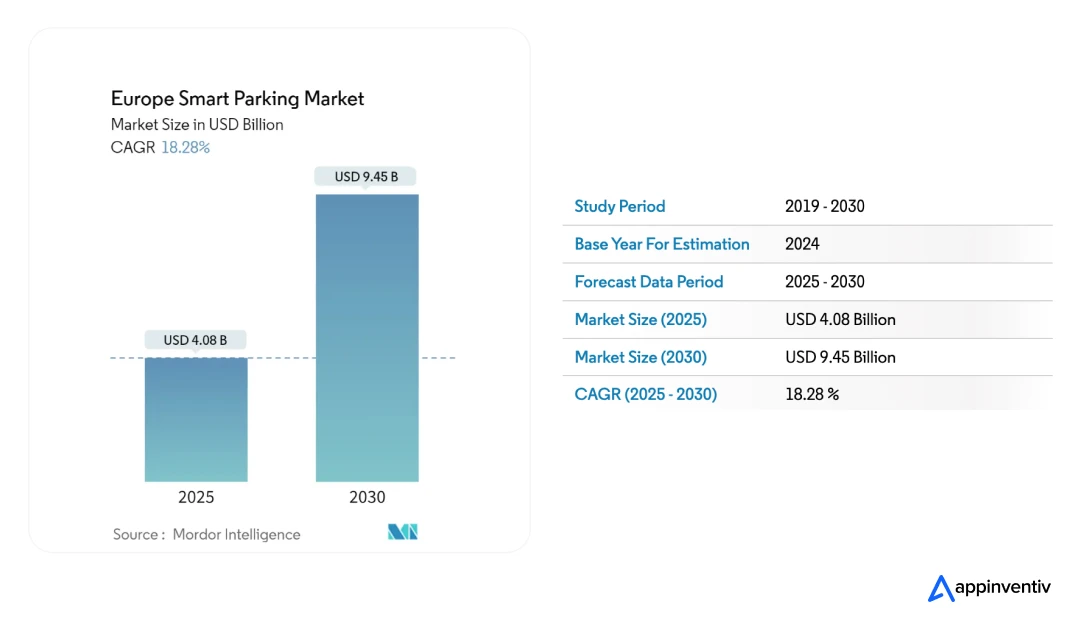
The Europe Smart Parking Market is estimated at USD 4.08 billion in 2025 and is expected to reach USD 9.45 billion by 2030, at a CAGR of 18.28% during the forecast period (2025-2030).
Typically, the cost to build a parking app like RingGo ranges from $40,000 to $400,000 (£32,000 to £320,000) or more, depending on several critical components (details later).
Developing a cashless parking app like RingGo involves several factors, including design, development, deployment, and ongoing maintenance.
This blog will serve as a roadmap for those considering such a venture. We will help you understand what it takes to build a competitive parking app, its essential features, and monetization strategies. With the right approach, businesses can enter the market and set new standards, ensuring their place in the rapidly evolving world of digital parking.
The Europe Smart Parking Market is skyrocketing—build your smart parking app with us.
Overview: RingGo Parking App
RingGo is among the UK’s leading cashless car park apps, allowing drivers to conveniently find, book, and pay for parking space using their mobile phones. It was launched in 2004 and revolutionized city car parking by eliminating the use of cash and creating a convenient digital option for motorists.

How Does the RingGo App Work?
The RingGo app simplifies parking in a few easy steps:
- Find a Parking Space – Users insert their location or permit GPS monitoring to see the available parking around them.
- Select & Pay – Once a spot is selected, users validate parking time and pay cashless with debit/credit cards, PayPal, or Apple Pay/Google Pay. Users can also opt for RingGo’s AutoPay feature to expedite payment.
- Manage Parking – Reminders are sent before sessions expire, enabling users to renew parking remotely. The AutoPay feature also allows users to extend their parking time remotely.
- Exit & Go – No need for a ticket; parking attendants verify sessions digitally through the system.
RingGo’s user-friendly interface, smart notifications, and secure payment processing make it a preferred parking solution for individuals and businesses across the UK.
Why Is RingGo Popular Across the UK?
- RingGo’s success results from its simplicity, coverage accuracy, and no-fuss service.
- It is accepted widely across thousands of parking sites, such as city centers, railway stations, town centers, and airports.
- The app allows multiple payment options, offers live availability, and coordinates with nearby councils to assist in effective parking management.
- The app also offers ticketless parking and the ability to extend sessions remotely, adding convenience and making it the first choice for millions of motorists in the UK.
Cost to Develop an App Like RingGo in the UK
As previously mentioned, the cost to build a parking app like RingGo can range from $40,000 to $400,000 (£32,000 to £320,000). However, this is a broad estimate, and the actual cost can vary significantly based on several factors that affect the complexity and scope of the app development. To get a rough estimate of the Cost to develop an app like RingGo in the UK, you can use the following formula:
Estimated Cost = Development Time x Hourly Rate
RingGo App Cost Breakdown by Complexity Levels
The cost to develop a parking app like RingGo varies based on complexity, features, and development approach. Here’s a breakdown:
1. Basic App (£32,000 – £69,000)
- Simple UI with essential features like user registration, location-based parking search, and cashless payments.
- Basic admin panel for parking management.
- Limited third-party integrations.
2. Moderate App (£69,000 – £161,000)
- Enhanced UI/UX with real-time availability updates and booking history.
- Push notifications as per strategies, dynamic pricing, and parking duration extensions.
- A more advanced admin dashboard with reporting and analytics is needed.
3. Advanced App (£161,000 – £320,000+)
- AI-driven parking predictions, multi-city access, and premium security features.
- Complex backend for high-traffic handling and seamless third-party integrations.
- Custom analytics, loyalty programs, and fleet management technologies.
The final cost to develop an app like RingGo in the UK depends on the tech stack, development team, and additional features tailored to your business needs.
Cost Breakdown by Development Stages
1. Planning & Research (£1,600 – £16,000)
Before development, thorough market research must be conducted to study user behavior, competitors, and industry trends in the parking sector. This includes establishing user personas, essential functionalities, and regulatory needs for cashless parking apps in the UK. Investment in this process guarantees that the app is market demand-oriented, reducing the expensive changes down the line during development.
2. UI/UX Design (£4,000 – £24,000)
The design procedure is about making the experience interactive and friendly for the user. Wireframing and prototyping help represent the app’s structure even before the app is developed. A good UI with visual storytelling, simple navigation, readable CTA buttons, and a reachable layout enhances usability, directly contributing to retention. Depending on whether additional things like dark mode, accessibility features, or animations are required, costs can increase.
3. App Development (£12,000 – £160,000)
This is the most time-consuming phase, with frontend and backend development.
- Frontend Development: Native development (iOS – Swift, Android – Kotlin) or cross-platform frameworks (Flutter, React Native) play a role in the cost. Native applications offer better performance, but cross-platform solutions save money and time.
- Backend Development: This entails API integration, database modeling, and cloud storage setup. The backend must be robust enough to handle real-time updates, secure transactions, and high user traffic. The parking app development price is based on the cloud provider used (AWS, Google Cloud, or Azure) and the level of scalability required.
4. Quality Assurance & Testing (£2,400 – £16,000)
Testing is a crucial stage to ensure the app works well without bugs. This includes:
- Functional Testing: Checking if fundamental functions like booking, payment, and navigation are working properly.
- Performance Testing: Ensuring the app’s behavior under huge numbers of users and network conditions.
- Security Testing: Identification of vulnerabilities in payment gateways and user authentication.
Advanced testing tools and automation can add to the cost but significantly enhance app reliability.
5. Deployment & Maintenance (£4,000 – £16,000/ annually)
Once the app has been built, it should be hosted on cloud servers and deployed on app stores. Apple App Store and Google Play Store both have listing fees, and there are other costs for GDPR compliance and UK-specific parking rules.
Before understanding mobile app maintenance costs, you must ascertain a few maintenance elements like – feature upgrades, bug fixes, and server monitoring to ensure the app remains operational and up-to-date. The more complex the app, the more expensive the maintenance.
The cost of developing a custom parking booking application completely depends upon the project requirements, complexity of the features, and third-party implementation. Firms must spend their budgets meticulously to balance cost and high-quality user interface properly.
Total Estimated Cost: £32,000 to £320,000
Factors Affecting the Cost to Build a Parking App Like RingGo
Developing a car parking app like RingGo involves multiple cost-driving factors, from UI/UX design to backend infrastructure and security. Here’s a breakdown of the key elements that influence the overall investment.
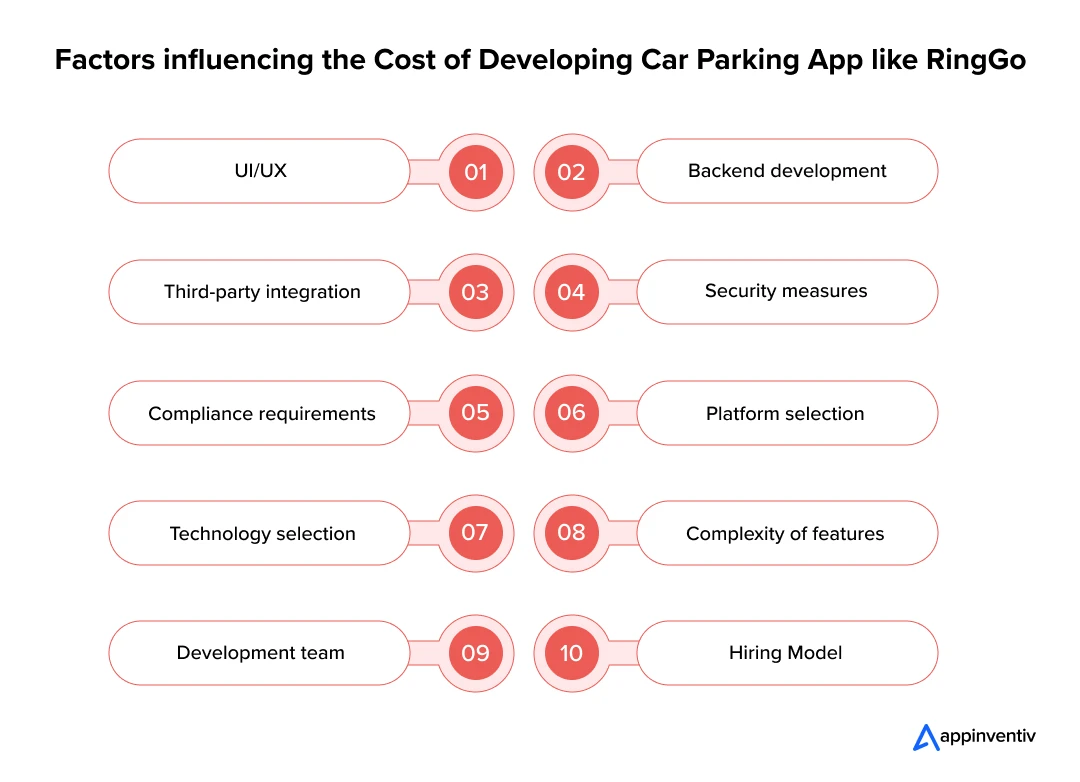
1. UI/UX Design
The complexity of the app’s interface and user experience impacts both development time and cost:
- Basic UI/UX: Minimalist design, simple navigation, and standard components.
- Moderate UI/UX: Custom elements, interactive UI, and improved user engagement.
- Advanced UI/UX: Animated transitions, micro-interactions, and dynamic themes for an enhanced experience.
2. Backend Development
The mobile app architecture ecosystem determines its efficiency, scalability, and performance:
- Basic Architecture: Simple database, user authentication, and core functions.
- Moderate Architecture: Data caching, real-time updates, and API integrations.
- Advanced Architecture: AI-driven analytics, high scalability, and multi-region cloud hosting.
3. Third-Party Integration
External services enhance functionality but add to development costs:
- Basic Integration: Payment gateways (Stripe, PayPal), login authentication.
- Advanced Integration: GPS tracking, real-time analytics, dynamic pricing algorithms.
4. Security Measures
A secure parking app must comply with data protection standards:
- Basic Security: SSL encryption, secure login mechanisms.
- Advanced Security: Implementation of Muli-Factor authentication, biometrics, and blockchain-based transactions.
5. Compliance Requirements
Legal and regulatory compliance impacts development costs:
- Basic Compliance: Local parking regulations and licensing.
- Advanced Compliance: KYC, AML, GDPR compliance, and secure financial transactions.
6. Platform Selection
Choosing the right platform affects both reach and cost:
- Single Platform: Developing for either iOS or Android reduces initial costs.
- Cross-Platform: Using Flutter or React Native allows simultaneous deployment on both platforms.
7. Technology Stack
Choosing the right technology stack for your mobile app influences performance and scalability:
- Basic Stack: For efficient performance, standard tech like Node.js, React, and AWS.
- Advanced Stack: AI, Blockchain, and Machine Learning (ML) models for business operations and analytics.
8. Complexity of Features
The number and sophistication of features define the development scope:
- Basic Features: GPS search, booking, and payment processing.
- Moderate Features: Parking history, loyalty programs, and notifications.
- Advanced Features: AI-driven parking suggestions, real-time occupancy tracking, and license plate recognition.
9. Development Team
The expertise required impacts costs based on team composition:
- Core Team: Project Manager, Tech Lead (Backend/Frontend), Mobile App Developers in the UK.
- Extended Team: Sr. Web & Backend Developer, DevOps, Business Analyst, UX/UI Designer, QA Specialist.
10. Hiring Model
The approach to hiring determines long-term costs and project control:
- In-House Team: Full control, higher salaries, and operational costs.
- Freelancers: Lower cost but potential lack of scalability.
- Outsourcing: Cost-effective without sacrificing quality, especially with offshore development teams.
By carefully evaluating these factors, businesses can decide to balance budget and functionality while ensuring a high-quality, scalable parking app.
Our expert mobile app development team is ready to analyze your requirements and provide a tailored estimate.
Hidden App Development Cost
While businesses focus on primary development expenses, several hidden costs can impact the budget. Recognizing these additional expenses ensures accurate financial planning and long-term app sustainability.
App Maintenance
Post-launch support is essential to keep the app functional and secure:
- Regular bug fixes and software updates for OS compatibility.
- Security audits and data encryption enhancements.
- Performance optimization to ensure seamless user experience.
App Hosting
Reliable hosting infrastructure is crucial for app performance and scalability:
- Cloud hosting costs (AWS, Google Cloud, Azure) vary based on storage, bandwidth, and traffic.
- Database management and backup solutions to handle growing user data.
App Promotion & Marketing
A well-developed app needs strategic marketing to gain traction:
- App Store Optimization (ASO): Improves visibility in app stores.
- Paid Ads: Google Ads, Facebook, and Instagram campaigns for user acquisition.
- Referral Programs & Discounts: Incentives for early adopters.
- Influencer & Social Media Marketing: Builds credibility and brand awareness.
Legal & Licensing Fees
Ensuring regulatory compliance adds to development costs:
- App Store Fees: $99/year (Apple) & $25 one-time (Google Play).
- Third-Party API Costs: Google Maps, payment gateways, and notification services charge recurring fees.
- Data Privacy Compliance: GDPR, KYC, and AML adherence to avoid legal penalties.
By accounting for these hidden costs, businesses can develop a well-rounded budget and ensure the long-term success of their parking app.
Tips to Optimize Costs to Build Apps Like RingGo
Developing a parking app can be expensive, but strategic planning can help optimize costs without compromising quality. Here’s how:
1. Outsourcing Development
Startups can outsource app development teams to reduce costs while significantly maintaining high-quality standards. Countries like India and Eastern Europe offer skilled developers at lower rates than the UK.
2. Choosing the Right Technology
Selecting a cost-effective tech stack is crucial:
- Cross-platform frameworks (Flutter, React Native) reduce development time and cost.
- Cloud-based solutions minimize infrastructure expenses.
3. Minimizing Feature Set
Instead of launching a full-featured app, start with a Minimum Viable Product (MVP) validation that includes essential functionalities like GPS-based search, booking, and payments. Additional features can be integrated later based on user feedback.
4. Efficient Project Management
- Using Agile methodologies ensures a flexible development process, avoiding costly rework.
- Clear documentation and requirement planning prevent scope creep and unnecessary expenses.
5. Automated Testing
Automated testing decreases manual labor, accelerates the development cycle, and guarantees a bug-free application, reducing long-term maintenance costs.
6. Regular Maintenance Checks
Regular updates and performance monitoring avoid serious problems that would result in costly repairs down the line. Regular maintenance keeps hosting and operational expenses at bay.
By implementing these cost-cutting measures, companies can create a high-quality parking app that is cost-effective and on time.
App Monetization Strategies for a Parking App Like RingGo
After developing a parking app, the second key step is implementing a viable and profitable monetization model. Although revenue from user transactions is the primary income stream, other models can make a big difference in long-term profitability. Below are some of the most effective monetization strategies:

1. Transaction Fees and Commissions
One of the most common ways to monetize is charging a minimal commission on each parking transaction facilitated through the app. Users pay for parking through the platform; a portion of each transaction is kept as a service fee. This generates a steady stream of revenue that grows with user adoption.
For example, if the customer hires a parking space for £5 per hour, the application can take 5-10% commission for every booking and earn interest in the long term as more and more customers become repeat users on the platform.
2. Account Management Fees
Parking operators, businesses, and fleet management firms need advanced services like bulk parking reservations, data analytics, and priority access to parking spaces. Levying an account management fee from these users for advanced features and administrative control can generate an extra revenue stream.
This model is best suited for corporate customers who need hassle-free parking management for staff or commercial fleets and are willing to pay a periodic fee for high-end access.
3. Subscription and Premium Models
Incorporating a subscription revenue model can offer users special advantages in return for a set monthly or yearly cost. Premium subscribers can enjoy benefits like reduced parking prices, priority reservations to highly demanded parking spaces, advertisement-free experiences, or booking advantages.
For instance, a £10 monthly subscription package might provide members with a 10% discount on all parking reservations, personalized customer service, or even the privilege of parking at VIP locations, making the service more desirable for regular users.
4. In-app Purchases
Providing extra paid services through the app can be another successful monetization option. Additional features like longer parking times, priority parking places, valet, or booking places at a premium price can be offered to the users.
For example, a customer who initially reserves a two-hour parking space can be offered an option to extend their duration without moving their car by paying extra within the app.
5. Advertising and Sponsored Content
By utilizing in-app advertising, a parking app can make money from local merchants, car service providers, and insurance firms wanting to reach a specific group. Sponsored content, banner advertisements, or local promotions may be integrated into the app layout without disrupting the user experience.
For example, a nearby car wash company can sponsor special promotional offers to users parked within a specific distance, stimulating additional user activity while creating a new income stream for the app.
6. Affiliate Marketing
The application can partner with mobility providers, car rental services, or auto insurers to earn money through referrals and affiliate marketing. With bundling services, the users can be incentivized to experiment with complementary products and services, and the application can get a commission on every transaction or referral.
For instance, a customer booking a parking space through the app can be provided with recommendations for lower-cost car rentals, insurance covers, or roadside assistance plans, and the app gets a commission on every sale.
7. Technology Services
In addition to individual consumers, parking apps can offer sophisticated technology solutions to companies that need effective parking management. Providing API integrations for fleet operators, intelligent parking management systems, and real-time occupancy monitoring can generate profitable B2B revenue streams.
Corporate customers can pay for bulk booking features, real-time analytics, and automated parking solutions, rendering the app a must-have for commercial parking requirements.
With these monetization approaches implemented, companies can maintain their parking app economically viable, expandable, and profitable long-term.
App Monetization Guide: 7 Strategies and Models Overview
Features to Build a Robust Parking App That Outperforms RingGo
To create highly performing features of a parking app like RingGo, it is essential to implement rich features that can boost user experience, increase operational effectiveness, and provide smooth parking management. The following are the major features that can differentiate your app:
1. User-Friendly Registration and Profile Management
A seamless onboarding experience with diverse sign-up methods, such as email, phone number, and social media log-in, provides effortless entry for users. Profile management must enable users to retain vehicle information, payment options, and booking history for smooth navigation.
2. Real-Time Parking Availability and Smart Search
An AI- and real-time data-driven advanced search facility can enable users to find available parking spaces quickly. Real-time availability updates through IoT-based sensors or GPS tracking reduce spot-finding inconvenience.
3. Advanced Booking and Reservation System
Offering users the option to pre-book parking spaces removes ambiguity and increases convenience. Dynamic pricing, cancellation rules, and time extension features increase user satisfaction and revenue generation.
4. Secure and Multiple Payment Options
The app should be equipped with multiple payment modes like credit/debit cards, mobile wallets, UPI, Apple Pay, Google Pay, and PayPal to support many users. Contactless payments and automated billing for registered users streamline transactions.
5. GPS Navigation and Route Optimization
Incorporating GPS navigation helps users arrive at their booked parking locations quickly. Route optimization through AI can recommend the shortest route depending on real-time traffic, minimizing delays and fuel usage.
6. License Plate Recognition (LPR) and Contactless Entry/Exit
Integrating LPR technology supports automatic vehicle identification for seamless entry and exit. This eliminates the requirement for physical tickets or manual checks, providing a better user experience.
7. Parking Time Alerts and Auto-Extension
Push alerts and SMS reminders inform users of their parking time, avoiding overstay penalties. Auto-extension features can be made available, letting users extend parking with a single tap.
8. Dynamic Pricing and Demand-Based Charges
Dynamic pricing supports parking prices based on demand, peak hours, and availability. This maximizes revenue collection while providing users with adaptable pricing choices.
9. Digital Parking Permits and Memberships
For regulars, the application must provide online parking permits and subscription plans with preferred advantages like discount prices, exclusive spaces, or unlimited entry in specific parking zones.
10. Parking History and Expense Tracking
A detailed transaction history with downloadable invoices lets users track their parking expenses. This feature is especially useful for corporate users who require expense reports for reimbursements.
11. Customer Support and Emergency Assistance
An infrastructure of specialized support, e.g., in-app assistance, email assistance, and helpline, facilitates simple problem-solving for users. Features such as roadside assistance or vehicle towing can be added for convenience.
12. Gamification and Loyalty Rewards
Implementing a reward scheme whereby users earn points for repeated bookings or referrals will boost app usage. The points can be redeemed for parking reductions, complimentary sessions, or partner special offers.
13. Multi-Platform Accessibility and Cross-Device Syncing
Making the app available on Android, iOS, and web environments provides customers with optimum convenience. Cross-device syncing allows easy switching between devices, enabling customers to manage their reservations comfortably.
By integrating all these innovative aspects, companies can build a strong, customer-focused car parking app that rivals and surpasses current offerings such as RingGo with greater convenience, efficiency, and profitability.
Share them with our mobile app experts and watch your vision transform into a powerful, feature-rich app.

Reimagine the Car Parking Experience with Appinventiv
Developing a parking app like RingGo is an apt opportunity for the UK market, as city traffic drives the demand for more intelligent parking systems. When choosing your tech partner, you must be very cautious regarding your objective, price, and long-term strategy.
However, partnering with Appinventiv, a leading Mobile App Development Company in UK helps you to access an easy-to-use parking app that involves intelligence, creativity, and a sharp sense of the market’s desires.
At Appinventiv, we provide unique business-critical mobile app solutions that render complete development solutions, from designing UI/UX to deployment and post-launch assistance. Our expert team of mobile app developers, AI engineers, and blockchain experts ensures your app works and is ready for the future.
Here’s why Appinventiv is the right choice for your app development project:
- Expertise That Stands Out: We have a proven track record of success, having developed numerous high-performance mobile apps across various sectors, including vehicle and fleet management. Our portfolio demonstrates our ability to deliver complex projects with precision and excellence.
- Leading with Innovation: We don’t just build apps; we innovate beyond that. We are known for integrating cutting-edge technologies like AI, blockchain, and IoT to provide functional and forward-thinking solutions that keep our clients ahead in the digital curve.
- Team of Skilled Experts: With a skilled team of over 1,600 tech experts, we have delivered 3000+ successful projects for many reputed brands like Mudra, KFC, Adidas, Edfundo, etc.
- Security at Its Core: Security is paramount thus we prioritize robust security protocols, ensuring that all applications adhere to the latest security measures to protect sensitive data and comply with international regulatory standards.
- Flexibility and Speed: By adopting an agile development methodology, we ensure that our projects are flexible enough to adapt to changes and efficient enough to deliver on time. This approach minimizes risks and speeds up the time to market, providing a competitive edge.
- Support Beyond Launch: Our relationship with clients doesn’t end at launch. We provide ongoing support and maintenance, helping keep the app updated with the latest technological advancements and security updates, ensuring smooth operation daily.
Take the next step towards digital transformation. Contact and collaborate with Appinventiv to develop innovative, scalable mobile apps.
Frequently Asked Questions (FAQs)
Q. How much does it cost to build a parking app like RingGo in the UK?
A. Parking app development prices can range between £32,000 to £320,000. Parking app development costs in the UK depend on features, the platform, and where the development team is based.
Q. What factors affect the cost to develop a Parking App in the UK?
A. The largest contributors to Parking app development costs in the UK are app complexity, technology stack, third-party integrations, developer fees, and upkeep costs.
Q. What are the benefits of a cashless parking app?
A. It provides hassle-free, cashless parking with real-time availability and simple payment.
Q. Which technologies are used to develop a parking app like RingGo?
A. Parking app development costs in the UK are also influenced by the technologies that are used, like Swift (iOS), Kotlin (Android), Flutter or React Native (cross-platform), Node.js or Python (server-side), and AWS or Firebase (cloud providers).
Q. How long does it take to build a cashless parking app?
A. The development would take 4 to 9 months based on the features, chosen platform, and the team’s experience.
Q. Can I integrate multiple payment options into my parking app?
A. Yes, you can integrate credit/debit cards, PayPal, Apple Pay, Google Pay, and even cryptocurrency payment processors for an easy transaction experience.


- In just 2 mins you will get a response
- Your idea is 100% protected by our Non Disclosure Agreement.
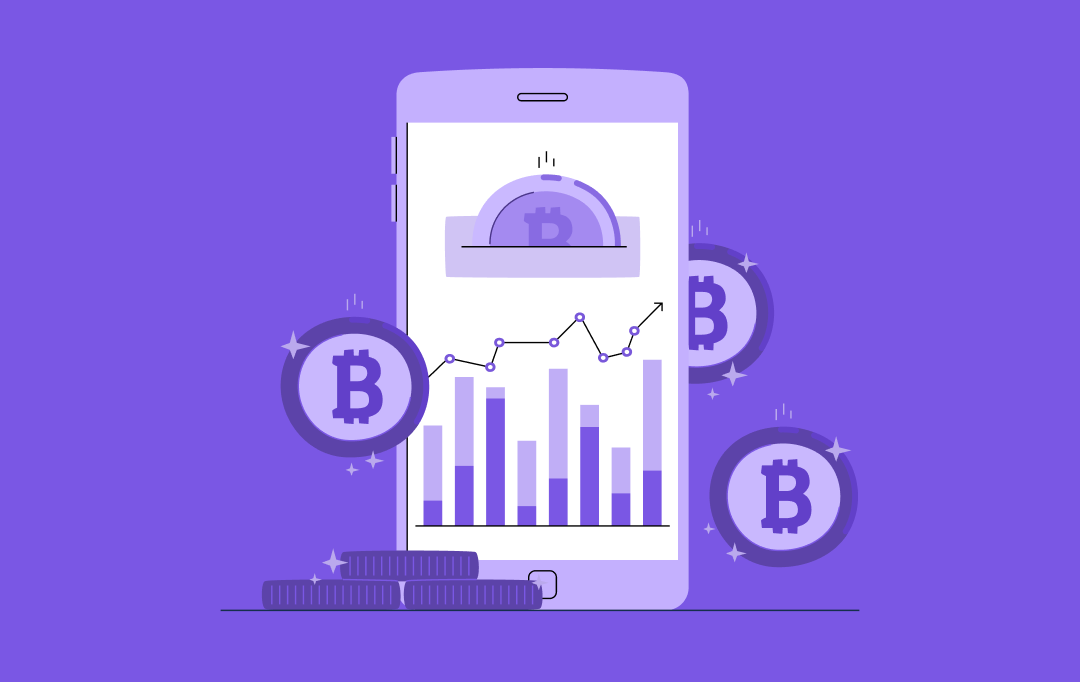
How Much Does It Cost to Build a Crypto Exchange App Like BitOasis in the UAE?
Key takeaways: The cost to build a crypto exchange app in the UAE ranges from $50,000 to $200,000. UAE regulations (VARA and Central Bank) impact development costs due to compliance needs. Advanced features like AI fraud detection increase development costs. The UAE crypto market is expected to grow significantly, offering huge potential. MVP and cross-platform…
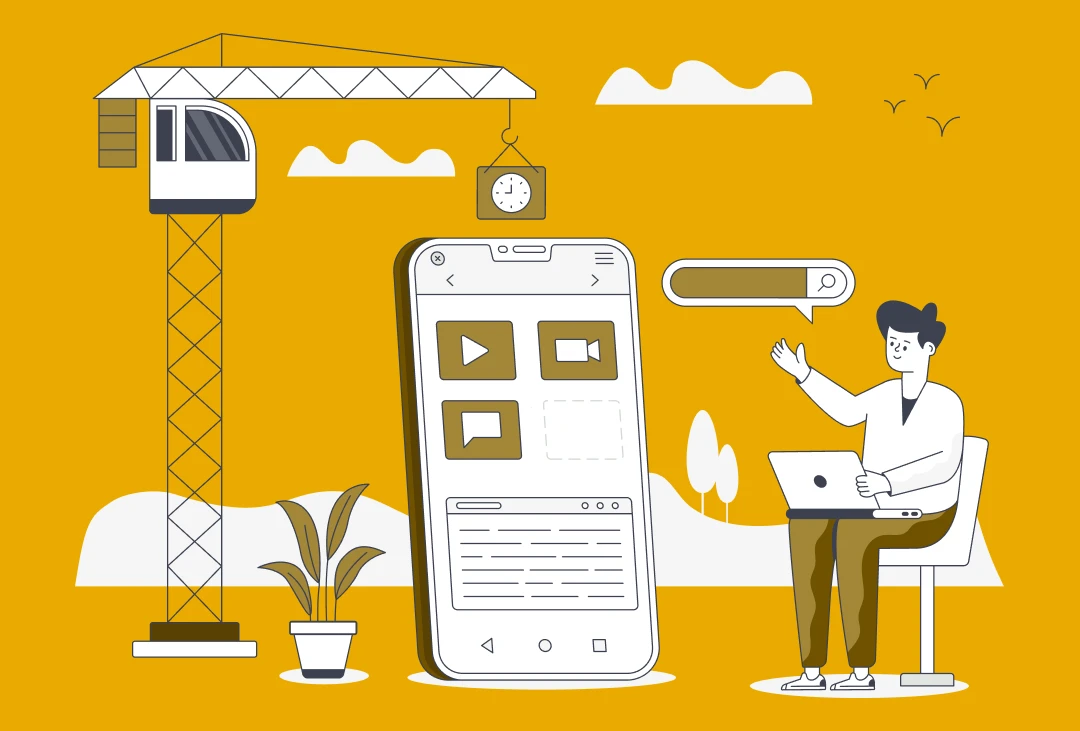
How Much Does It Cost to Build An App Like Kayo Sports in Australia?
Key takeaways: Wide Cost Range: Developing a Kayo Sports-like app in Australia can cost between AUD 45,000 (MVP) and over AUD 750,000 for a full-featured, scalable platform. Feature Complexity Impacts Budget: High-end features, such as multi-view streaming, AI personalization, and multi-device support, significantly increase development costs. Ongoing Hidden Costs: Content licensing, cloud infrastructure, compliance, and…
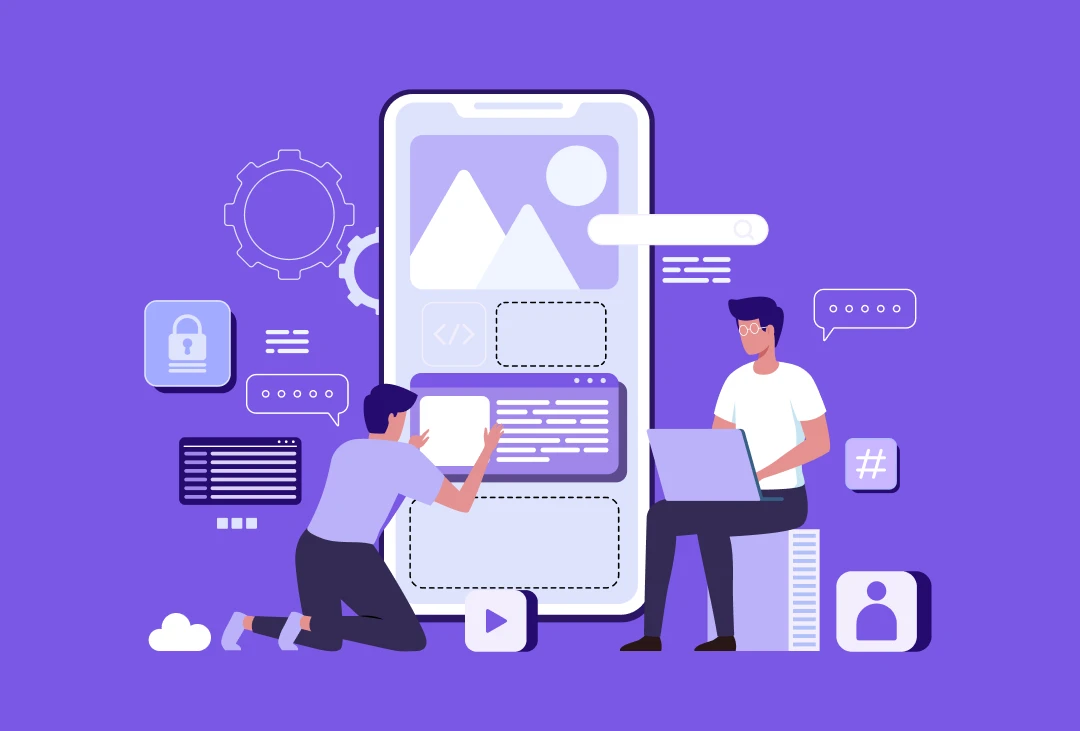
How Much Does It Cost To Build An App in Singapore?
Key takeaways: Mobile app development costs in Singapore range from SGD 40,000 to over SGD 530,000, depending on complexity, platform, and features. Basic apps start at: SGD 40,000. High-end apps using advanced technologies like AI or blockchain can exceed SGD 530,000. Key factors such as platform selection (iOS, Android, Cross-Platform), app complexity (basic, medium, high),…

















